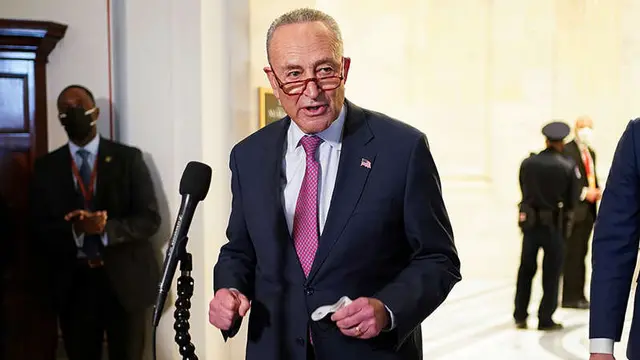Majority Leader Charles Schumer (D-N.Y.) announced on Thursday night that the Senate will take up voting rights legislation on Tuesday, missing his self-imposed deadline to hold a vote on changing the filibuster by Monday, Jan. 17.
The change in the Senate schedule comes after Sen. Brian Schatz (D-Hawaii) announced he was isolating after testing positive for COVID-19 in a breakthrough case, leaving Democrats one vote short on their ability to start debate on the voting rights bill. Senators are also worried about the potential for another snowstorm in Washington, D.C., on Sunday into Monday.
"I have a short announcement about the schedule. Due to circumstances regarding COVID and another potentially hazard winter storm approaching the D.C. area this weekend, the Senate will adjourn tonight. However, we will be postponing the recess so the Senate can vote on voting rights. We will return on Tuesday to take up the House-passed message containing voting rights legislation," Schumer said from the floor.
The Senate had been scheduled to be out of town after Friday for a one-week recess, but Schumer's move means the break will be delayed. Schumer said the one-week recess will now take place the week of Jan. 24.
Schumer's decision to move forward with the voting rights bill comes even as Democrats' hopes of changing the legislative filibuster unraveled on Thursday with Sens. Joe Manchin (D-W.Va.) and Kyrsten Sinema (D-Ariz.) reiterating that they do not support changes to the legislative filibuster, which requires 60 votes for most legislation to advance in the Senate.
But Democrats view the voting rights legislation as crucial as GOP-controlled state legislatures debate and enact new voting rules in the wake of the 2020 election, which former President Trump and his closest allies have falsely claimed was "stolen."
The filibuster and voting rights are linked because Republicans have blocked three previous election-related bills. The legislation Senate Democrats will take up next week was passed by the House on Thursday. It merges the John Lewis Voting Rights Advancement Act, which strengthens the 1965 Voting Rights Act, and the Freedom to Vote Act, which overhauls federal elections.
Though Democrats are using a procedural loophole to sidestep the ability for Republicans to block them from debating the voting legislation, they will still need 60 votes to overcome a hurdle on ending debate. If Republicans block the bill, Schumer pledged on Thursday night to move forward with trying to change the Senate's filibuster.
"Members of this chamber were elected to debate and to vote, particularly on an issue as vital to the beating heart of our democracy as this one, and we will proceed. And if the Senate Republicans choose obstruction over protecting the sacred right to vote, as we expect them to, the Senate will consider and vote on changing the Senate rules," Schumer said.
To change the rules without GOP support, Schumer would need total unity from all 50 Senate Democrats, something he doesn't have. Manchin and Sinema made clear that they won't support a change to the 60-vote filibuster. Other Democratic senators haven't committed to backing a rules change along party lines, while Sen. Mark Kelly (D-Ariz.) hasn't yet thrown his support behind a filibuster reform option.
Democrats haven't yet outlined what their rules change proposal will be as they try to figure out what unifies most of the caucus. They are discussing the possibility for a talking filibuster, which would let opponents delay the bill for as long as they could hold the floor. After that the bill could pass with a simple majority. But there are questions among Democratic senators about how to structure the details of a talking filibuster and the mechanics of how it would work.
Democrats are also discussing the possibility of a carve-out for voting legislation, which would exempt the legislation from needing 60 votes while keeping the hurdle intact for other bills.
But neither of those changes will be able to pass without both Manchin and Sinema, who met with President Biden at the White House on Thursday night to discuss voting rights.
Even as they are poised to fail, Democrats view voting rights legislation as too big of a priority to not push forward and are under intense pressure from their base to go all in to try to pass a bill, even if they fall short. But forcing a rules change vote will also mean that Senate Democrats, including vulnerable 2022 incumbents, will have to go on the record in what could become fodder for GOP campaigns.
Schumer, however, argued on Thursday night that senators "were elected to debate and to vote, particularly on an issue as vital to the beating heart of our democracy as this one."
"If the right to vote is the cornerstone of our democracy, then how can we in good conscience allow for a situation in which the Republican Party can debate and pass voter suppression laws at the state level with only a simple majority vote, but not allow the United States Senate to do the same?" Schumer asked. "In the coming days we will confront this sobering question."
(THE HILL)
 简体中文
简体中文

